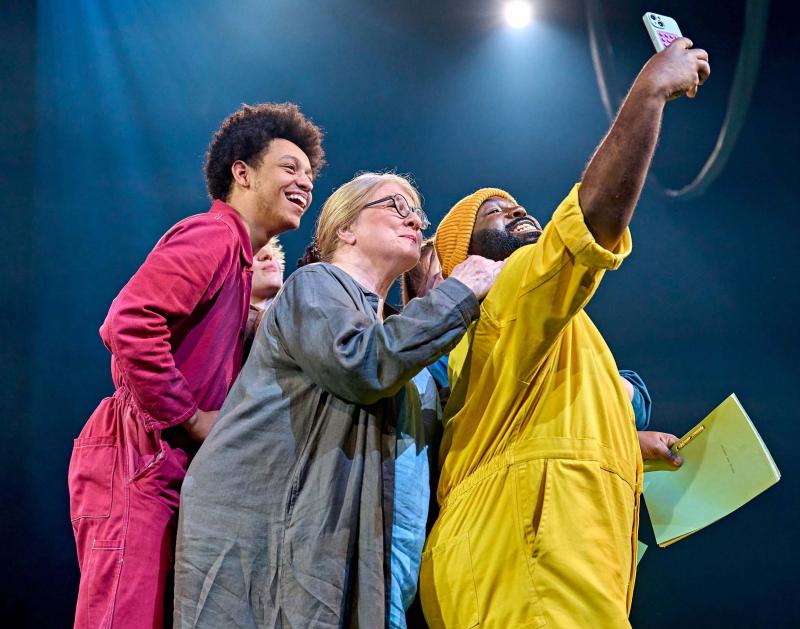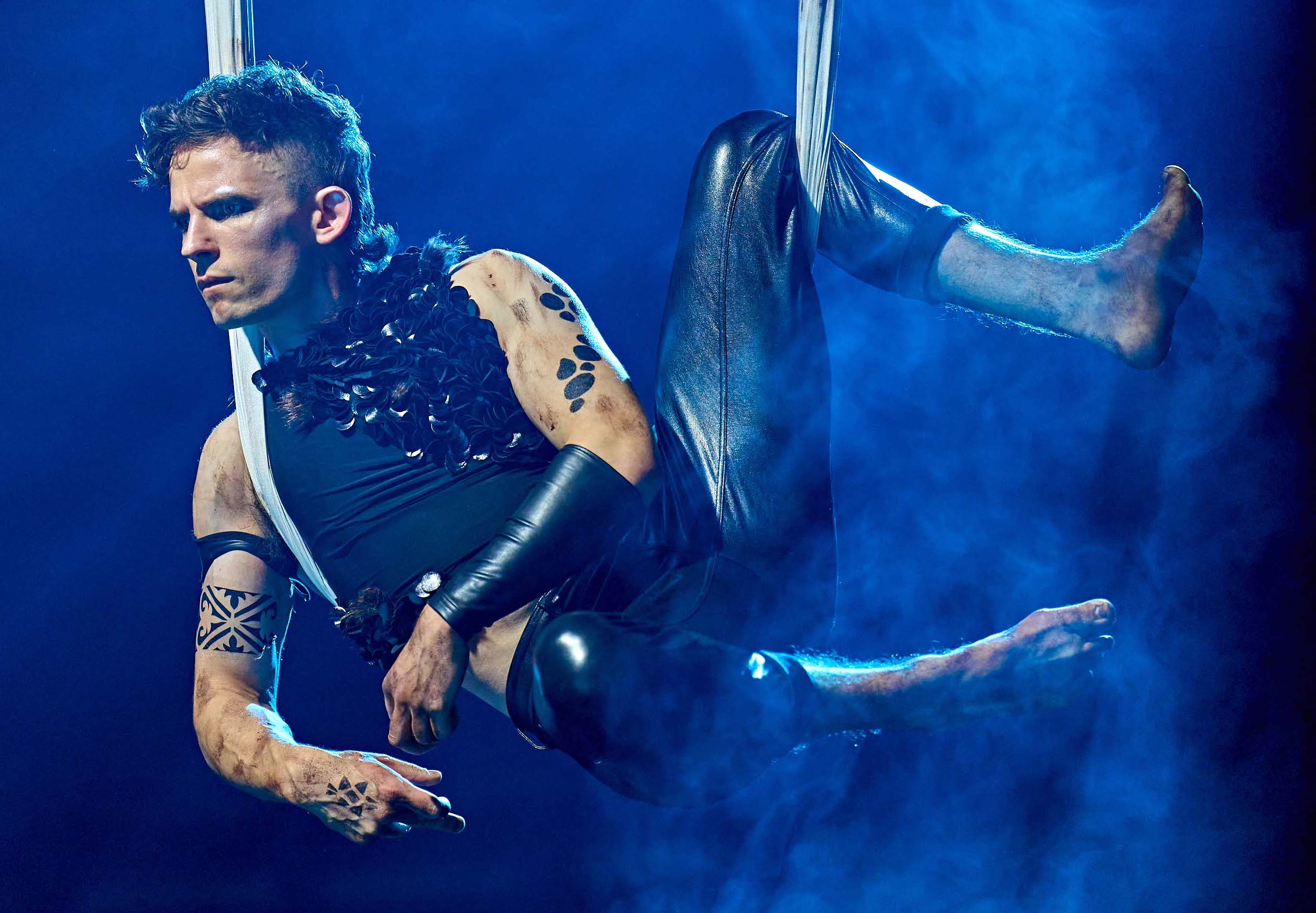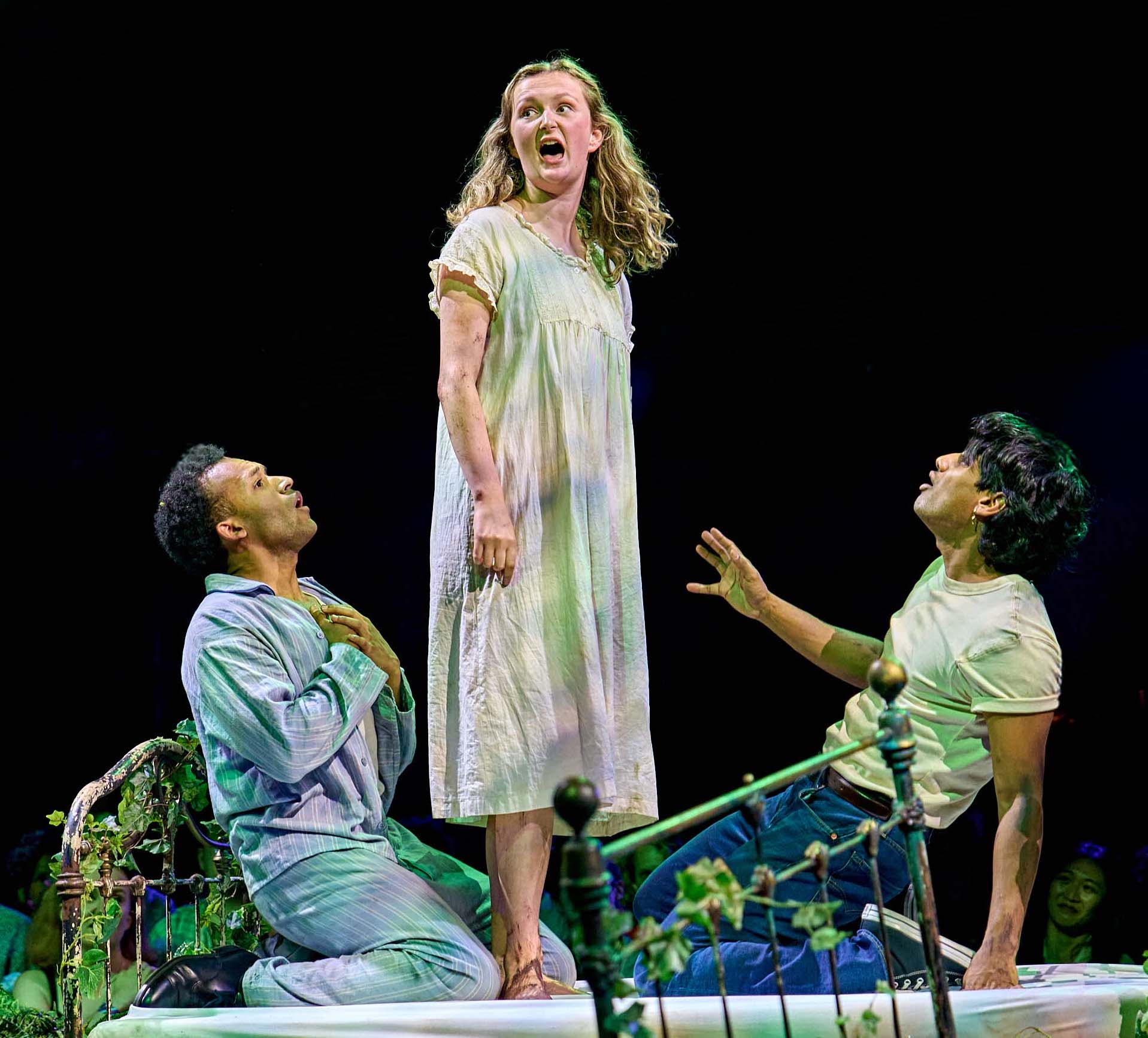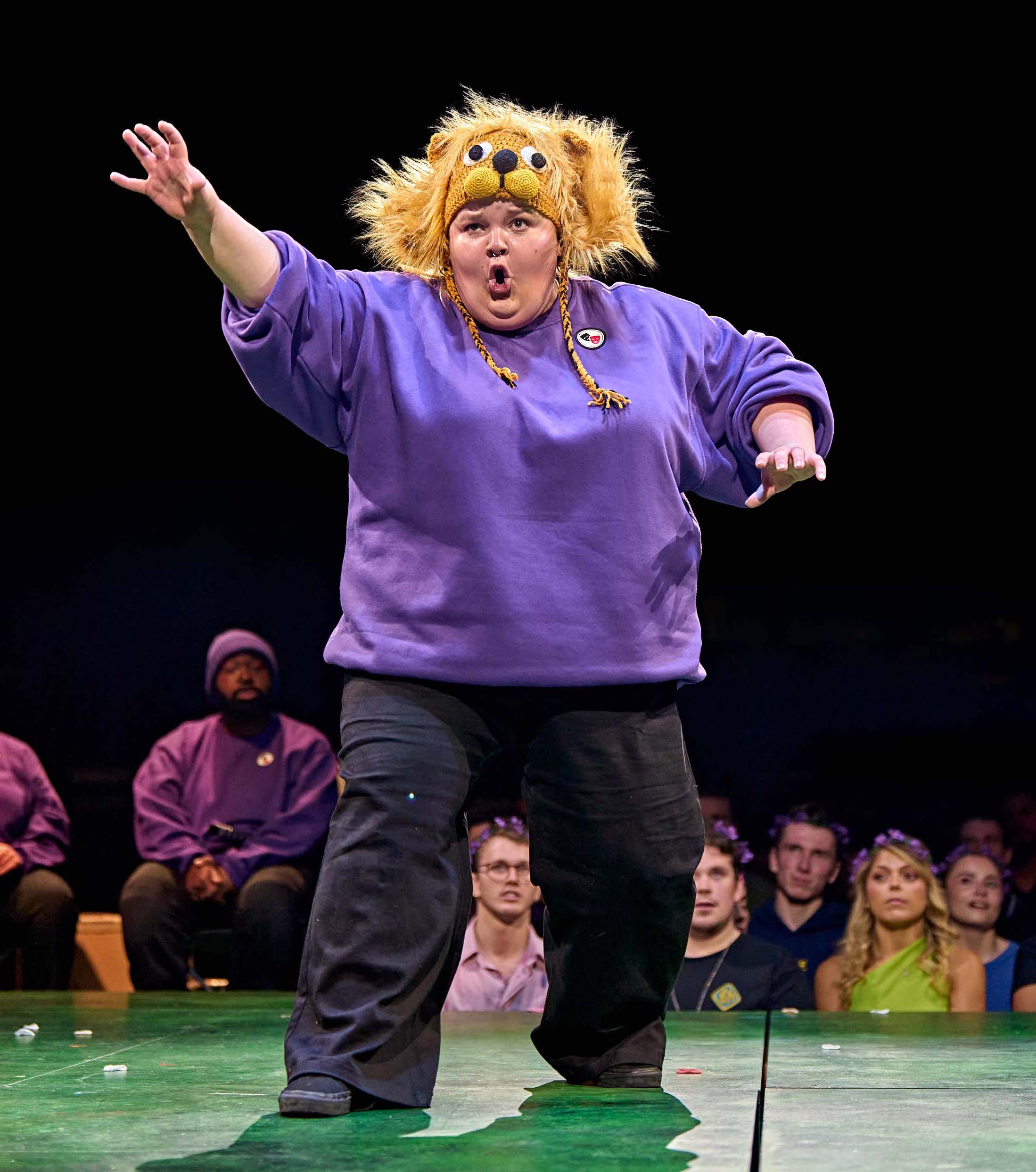A Midsummer Night's Dream, Bridge Theatre review - Nick Hytner's hit gender-bender returns refreshed | reviews, news & interviews
A Midsummer Night's Dream, Bridge Theatre review - Nick Hytner's hit gender-bender returns refreshed
A Midsummer Night's Dream, Bridge Theatre review - Nick Hytner's hit gender-bender returns refreshed
This Dream is a great night out, especially for Shakespeare first-timers

It’s a sign of the inroads that the term “immersive” has made in theatreland that it now gets jokily namedropped at the Bridge inside Shakespeare’s actual text, when Duke Theseus tells his new bride Hippolyta not to flinch when the Rude Mechanical playing Moon shines a bright light in her eyes: “It’s immersive.”
Is it? I prefer the traditional term for this production’s technique of having a “pit” full of standing audience members who are relentlessly shepherded from raised platform to raised platform. Which is “promenade”. It’s as old as the medieval Mystery plays. But predictably, younger playgoers love bobbing about close to the actors, even touching them and chatting to them (though I did see a couple of teenage boys baulking at holding hands with each other when the prommers were invited to dance in a circle around the space at the end).
Nick Hytner’s production, back after its triumphant 2019 run, probably has more in common with Elizabethan theatregoing than the wannabe modish shows given the “immersive” tag, too, It walks a fine line between reverent drama and lampoon, liberally adding asides (“You selfish bastard”, “for God’s sake”) and anachronisms (triggering, selfies, mosh pit diving) and bending genders all over the place. The looseness of the concept and parallel freedom with the text is probably in the spirit of Shakespeare, if not true to his original ideas.
Here, Oberon (JJ Feild) is the gulled immortal who becomes enamoured of an ass, not Titania; Puck’s flower therapy at one point impels the two pairs of lovers into a brief bout of same-sex coupling, as well as mismatching them to the wrong loved ones. Pop culture is everywhere, from the disco-tastic trapeze-artist fairies in lurid frilly knickers and sparkly tops to the street-dancing posse of sweatshirted Rude Mechanicals. Actual pop hits thread through the action — “Je t’aime, moi non plus” takes us into the interval as Oberon’s doctored eyes fall on a yellow boilersuited ass, and “I Can See Clearly Now” almost predictably accompanies his release from Bottom-fancying. The energy and exuberance of the players is one of the production’s big draws. As before, the fairies cavort overhead on sling trapezes, joined this time by plucky Susannah Fielding as an imperious Titania. Supreme among them is a returning performer from 2019, David Moorst (pictured above), whose leather-legginged Puck is a joy: a snide, acrobatic northerner who chastises the “Londoners” in his way, pronounces fairies as “furries” and relishes his lines, arguably the best poetry in the piece. Some of his exits and entrances make for magical theatre.
The energy and exuberance of the players is one of the production’s big draws. As before, the fairies cavort overhead on sling trapezes, joined this time by plucky Susannah Fielding as an imperious Titania. Supreme among them is a returning performer from 2019, David Moorst (pictured above), whose leather-legginged Puck is a joy: a snide, acrobatic northerner who chastises the “Londoners” in his way, pronounces fairies as “furries” and relishes his lines, arguably the best poetry in the piece. Some of his exits and entrances make for magical theatre.
The mortals are represented by a saturnine Theseus (Feild again), who in the first scene seems to have shut up his stern Amazonian fiancée Hippolyta (also Fielding) in a glass box for safe keeping. His Athens is a sinister place where curfews are strictly observed, and you have no doubt death really will be the penalty for parental disobedience. When the duke and his consort reappear later in the hunting scene, her long black leather coat and his black waxed number suggest the antithesis of the glittery immortals they have just been playing.
 No wonder Athenian Hermia is dressed like an escapee from Margaret Atwood’s Gilead. Nina Cassells plays her with a strength that fits well her description as little but “fierce”. All four lovers are impressively sound deliverers of the text. Divesh Subaskaran (pictured far right with Paul Adeyefa and Lily Simpkiss) is a raffish, smooth-talking Lysander, Paul Adeyefa a nicely defined, mature Demetrius. Earning most of the laughs is Lily Simpkiss’s rangy Helena, for once a true “maypole”, who invests the flustered, chatty lover with an engaging freshness and candour.
No wonder Athenian Hermia is dressed like an escapee from Margaret Atwood’s Gilead. Nina Cassells plays her with a strength that fits well her description as little but “fierce”. All four lovers are impressively sound deliverers of the text. Divesh Subaskaran (pictured far right with Paul Adeyefa and Lily Simpkiss) is a raffish, smooth-talking Lysander, Paul Adeyefa a nicely defined, mature Demetrius. Earning most of the laughs is Lily Simpkiss’s rangy Helena, for once a true “maypole”, who invests the flustered, chatty lover with an engaging freshness and candour.
This quartet is almost overshadowed by the mechanicals, led by another returning actor from 2019, Felicity Montagu as Quince, a classic brisk but jolly WI lady. Molly Hewitt-Richards (pictured below) is a funnily pugnacious Snug, a Lion who opts for slugging her prey with her fists; Jem Rose has fun in her debut role playing Snout as a bored teenager. But this group are in turn almost overshadowed by Emmanuel Akwafo as Bottom.
In the role that catapulted Hammed Animashaun to fame in 2019, Akwafo is a similar life force, an intermittently camp Bottom who seems to have workshopped a lot of contemporalia into the role. As he shows off his dramatic range to the palace worthies at the end of his play, he re-enacts the death throes of a string of action-movie heroes in an array of accents, finishing himself off with a plastic light-sabre that plays a tune. The prommers went wild, especially when Moon’s novelty musical Christmas tree and animatronic dog joined in.
 Against all this mayhem, the “straight” actors, Feild and Fielding, have an uphill battle. Fielding’s natural knack for comedy is slightly muted here, and Feild has less of the sneering insouciance of his predecessor, Oliver Chris, an aristo you loved to see brought low, though Feild sports the sparkly budgie smuggler he gets to wear when he and Akwafo share a bubble bath with suitable panache.
Against all this mayhem, the “straight” actors, Feild and Fielding, have an uphill battle. Fielding’s natural knack for comedy is slightly muted here, and Feild has less of the sneering insouciance of his predecessor, Oliver Chris, an aristo you loved to see brought low, though Feild sports the sparkly budgie smuggler he gets to wear when he and Akwafo share a bubble bath with suitable panache.
Key to the whole enterprise is Bunny Christie’s staging that, like her designs for the Bridge’s blockbuster Guys and Dolls, deploys every device it can to keep the action, and the promming audience, moving. Platforms with antique brass beds on them rise up and down to accommodate the lovers’ tangles, an ornate double bed similarly serves as the trysting place for Oberon and Bottom, with the aerialist fairies moving around above them on its metal canopy. The actors can be winched far up on their platforms or slings until they re-enter, or whisked away down steps through the prommers, into the darkness.
Hytner and team have given the piece an added pep that one hopes will convert a new generation to theatre-going, even if what they are seeing is drama-as-play. It's never less than entertaining whatever your age, unless you are a Bard-purist.
rating
Explore topics
Share this article
The future of Arts Journalism
You can stop theartsdesk.com closing!
We urgently need financing to survive. Our fundraising drive has thus far raised £49,000 but we need to reach £100,000 or we will be forced to close. Please contribute here: https://gofund.me/c3f6033d
And if you can forward this information to anyone who might assist, we’d be grateful.

Subscribe to theartsdesk.com
Thank you for continuing to read our work on theartsdesk.com. For unlimited access to every article in its entirety, including our archive of more than 15,000 pieces, we're asking for £5 per month or £40 per year. We feel it's a very good deal, and hope you do too.
To take a subscription now simply click here.
And if you're looking for that extra gift for a friend or family member, why not treat them to a theartsdesk.com gift subscription?
more Theatre
 The Weir, Harold Pinter Theatre review - evasive fantasy, bleak truth and possible community
Three outstanding performances in Conor McPherson’s atmospheric five-hander
The Weir, Harold Pinter Theatre review - evasive fantasy, bleak truth and possible community
Three outstanding performances in Conor McPherson’s atmospheric five-hander
 Dracula, Lyric Hammersmith review - hit-and-miss recasting of the familiar story as feminist diatribe
Morgan Lloyd Malcolm's version puts Mina Harkness centre-stage
Dracula, Lyric Hammersmith review - hit-and-miss recasting of the familiar story as feminist diatribe
Morgan Lloyd Malcolm's version puts Mina Harkness centre-stage
 The Code, Southwark Playhouse Elephant review - superbly cast, resonant play about the price of fame in Hollywood
Tracie Bennett is outstanding as a ribald, riotous Tallulah Bankhead
The Code, Southwark Playhouse Elephant review - superbly cast, resonant play about the price of fame in Hollywood
Tracie Bennett is outstanding as a ribald, riotous Tallulah Bankhead
 Reunion, Kiln Theatre review - a stormy night in every sense
Beautifully acted, but desperately grim drama
Reunion, Kiln Theatre review - a stormy night in every sense
Beautifully acted, but desperately grim drama
 The Lady from the Sea, Bridge Theatre review - flashes of brilliance
Simon Stone refashions Ibsen in his own high-octane image
The Lady from the Sea, Bridge Theatre review - flashes of brilliance
Simon Stone refashions Ibsen in his own high-octane image
 Romans: A Novel, Almeida Theatre review - a uniquely extraordinary work
Alice Birch’s wildly epic family drama is both mind-blowing and exasperating
Romans: A Novel, Almeida Theatre review - a uniquely extraordinary work
Alice Birch’s wildly epic family drama is both mind-blowing and exasperating
 The Producers, Garrick Theatre review - Ve haf vays of making you laugh
You probably know what's coming, but it's such great fun!
The Producers, Garrick Theatre review - Ve haf vays of making you laugh
You probably know what's coming, but it's such great fun!
 Not Your Superwoman, Bush Theatre review - powerful tribute to the plight and perseverance of Black women
Golda Rosheuvel and Letitia Wright excel in a super new play
Not Your Superwoman, Bush Theatre review - powerful tribute to the plight and perseverance of Black women
Golda Rosheuvel and Letitia Wright excel in a super new play
 Cow | Deer, Royal Court review - paradox-rich account of non-human life
Experimental work about nature led by Katie Mitchell is both extraordinary and banal
Cow | Deer, Royal Court review - paradox-rich account of non-human life
Experimental work about nature led by Katie Mitchell is both extraordinary and banal
 Deaf Republic, Royal Court review - beautiful images, shame about the words
Staging of Ukrainian-American Ilya Kaminsky’s anti-war poems is too meta-theatrical
Deaf Republic, Royal Court review - beautiful images, shame about the words
Staging of Ukrainian-American Ilya Kaminsky’s anti-war poems is too meta-theatrical
 Laura Benanti: Nobody Cares, Underbelly Boulevard Soho review - Tony winner makes charming, cheeky London debut
Broadway's acclaimed Cinderella, Louise, and Amalia reaches Soho for a welcome one-night stand
Laura Benanti: Nobody Cares, Underbelly Boulevard Soho review - Tony winner makes charming, cheeky London debut
Broadway's acclaimed Cinderella, Louise, and Amalia reaches Soho for a welcome one-night stand
 The Pitchfork Disney, King's Head Theatre review - blazing with dark energy
Thrilling revival of Philip Ridley’s cult classic confirms its legendary status
The Pitchfork Disney, King's Head Theatre review - blazing with dark energy
Thrilling revival of Philip Ridley’s cult classic confirms its legendary status

Add comment